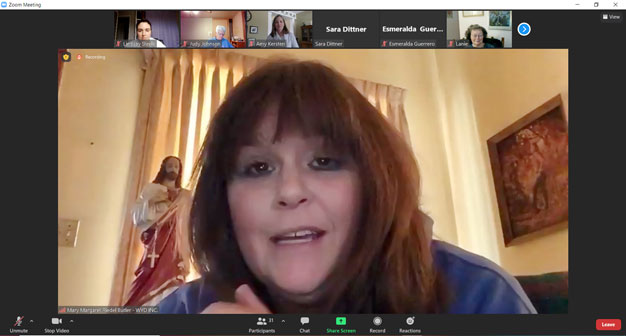
Mary Margaret Butler, founder of Whatsoever You Do in Ottumwa, speaks during the Diocese of Davenport’s monthly Lunch and Learn speaker series Feb. 3 over Zoom.
By Lindsay Steele
The Catholic Messenger
Sara Dittner was working as an emergency services coordinator at the Salvation Army in Burlington when she heard about a family with five small children living in a recreational vehicle.
She couldn’t find any place in the community to help the family, she recalled. The homeless shelter in town couldn’t accommodate a family of that size. “I kept thinking there has to be something that can be done about this situation.”
Shortly afterwards, she received an email from Craig Fenton, founder of Transitions DMC, a nonprofit organization in Burlington. A member of Divine Mercy Parish in Burlington/West Burlington, Fenton shared a desire to address the unmet needs of the homeless in Burlington.
They pursued that dream and in January 2022 Transitions DMC opened its homeless shelter, with Dittner serving as CEO and director. “It’s been a journey for us, with a lot of lessons learned,” Dittner said.
Dittner and Fenton spoke during the Diocese of Davenport’s monthly Lunch and Learn series Feb. 3 over Zoom. The event focused on the ways two southeast Iowa organizations, Transitions DMC and Whatsoever You Do in Ottumwa, work to address unmet needs of the homeless in their communities.
Representatives from both organizations said people tend to associate homelessness with big cities, but it also occurs in smaller communities that may not be as well equipped to assist individuals and families in need. Fenton and Mary Margaret Butler, founder of Whatsoever You Do, “recognized a need in their community and stepped up to address it,” said Amy Kersten, a diocesan Social Action Office volunteer who organizes and hosts Lunch and Learn.
Transitions DMC has 13 beds and averages nine guests a night, Dittner said. Guests can stay a maximum of 30 days, with longer stays possible if they have future housing plans in place. She said Catholic organizations and donors have been the biggest source of funding for the shelter. “I was raised Protestant, and I’ve been touched by the generosity of the Catholic community in this area.” The shelter has the potential to expand if the need arises, she said.
Butler started Whatsoever You Do (WYD) in Ottumwa 11 years ago as a Facebook community to connect people in need with donors. Her focus shifted to establishing a homeless shelter about five years ago when she came across a homeless man sleeping behind a fast-food restaurant in Ottumwa. “He had no skin on the bottom of his feet and wore Kotex pads as shoes.” She felt there was “no excuse” for someone in a large community like Ottumwa to have to live like that. “He now has an apartment in Des Moines and a job, but that’s what opened my eyes. I prayed hard about it, and God started opening the door.”
Butler, a lifelong Catholic, said Ottumwa lacks overnight options for homeless individuals in general, but especially for women and children who are not victims of domestic violence. Initially, WYD Inc. provided tents and sleeping bags for people who were homeless. When winter set in, the nonprofit organization rented apartments for people who needed a roof over their head. That effort continued for three years, but became unsustainable.
WYD is in the process of renovating a former Presbyterian church building, and hopes to open its doors to women and children later this year. As funding comes in, WYD plans to expand into other areas of the building to accommodate other demographics.
Both organizations said their ultimate goal is to help homeless individuals and families to find permanent housing. This requires addressing the issues that lead to homelessness, such as addictions, mental health issues and lack of affordable housing options. Transitions DMC and WYD work to connect the people in their care to resources that can help them overcome these obstacles.
“We are basically working with a bunch of other organizations,” Fenton said. “We’re calling hospitals, psych providers and setting up appointments and making sure people get there — all the things that are just basic to getting started. Otherwise, we’re sending them back onto the street, and that’s not where we want them to be.”
Butler echoed the sentiment. “This is a community project. No one person or group can do this. The more you reach out to people in the community and work together, miracles happen.”











